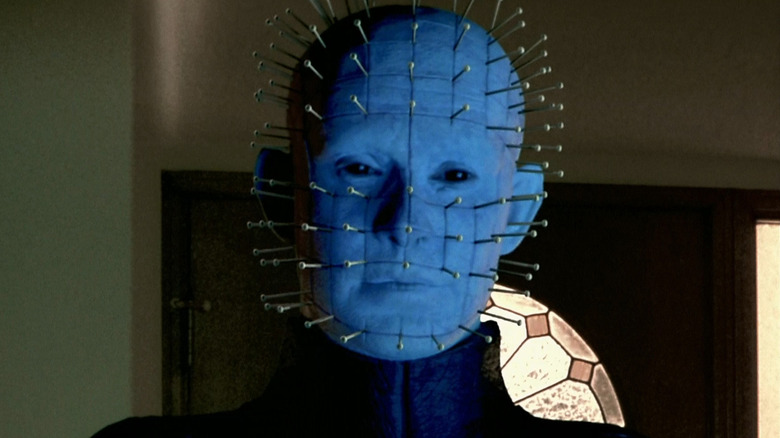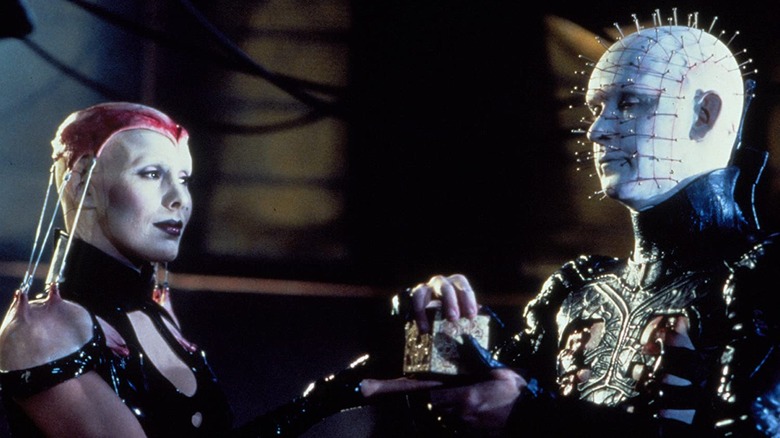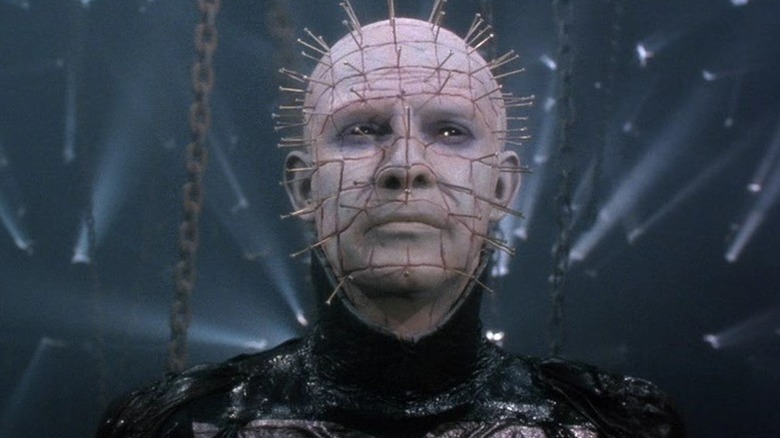The Canceled Hellraiser Sequel That Could Have Saved The Horror Franchise
Clive Barker's "Hellraiser" franchise used to have such sights to show us. The original movie, adapted from Barker's own "The Hellbound Heart" novella, is a warped masterpiece about dysfunctional family drama and taboo-shattering depravity — one that introduced viewers to the Cenobites, horror's greatest (and weirdest) villains. The following three films (beginning with the excellent "Hellbound: Hellraiser II" and ending with the underrated, but could have been better, "Hellraiser: Bloodline") differ in quality, but they are full of ideas that elevate them beyond typical hack-and-slash fare. Everything that comes after — well, most fans don't want to talk about those doom-and-gloom years (and for good reason). That said, one unrealized sequel, "Hellraiser: Lament," could have breathed life back into the Cenobites during that down period, but as is always the case with things that are too good to be true, it wasn't to be.
Peter Briggs is one of the best Hollywood screenwriters you've never heard of. He is perhaps best-known for contributing to 2004's "Hellboy," but most of his projects are either stuck in development hell or have since been retooled by other filmmakers ("Alien vs. Predator, "Freddy vs. Jason," and "Judge Dredd," to name some examples). After writing an impressive spec script for "Freddy vs. Jason" in the 1990s, Dimension approached Briggs to write a treatment for the seventh installment in the "Hellraiser" film series — and let's just say that his idea sounds more interesting than the DTV sequel that was released in its place.
So, what was "Lament" about, why did it get canceled, and how could it have saved a property that started out so promising only to have legendary suffering inflicted upon it? Let's dig in.
What was the idea for Hellraiser: Lament?
"Hellraiser: Lament" would have ignored the events of the standalone fifth and sixth sequels, "Hellraiser: Inferno" (which was almost very different before Scott Derrickson took over) and "Hellraiser: Hellseeker," continuing the events explored in the first four movies instead. What's more, it would have brought back some blasts from the past — of the evil variety.
As documented by Bloody-Disgusting, "Lament" opens with the revelation that Pinhead and other notable Cenobites have been imprisoned by their god, Leviathan, for stepping out of line. The action then moves to 1750s North America, where Duke De L'Isle — the aristocratic occultist who commissioned a toymaker to create a demon-summoning puzzle box in "Hellraiser: Bloodline" — oversees the development of a town in the Appalachian Mountains. This is no ordinary town, however, as it is built on material from Leviathan's body and is designed to form the shape of the puzzle box that summons the forces of Hell.
In the present day, the town is called Lament — a haven of apple-pie Americana that offers little entertainment for the story's teenage protagonists. That said, they get an injection of excitement when a teacher — who, in true "Hellraiser" fashion, is not who he appears to be — opens the gate that frees the Cenobites from captivity. From there, the suffering is legendary, as Pinhead unleashes a Cenobite army with the goal of establishing a New Order. (Fun fact: "Hellraiser: The New Order" was another working title for "Lament.") Unfortunately, Angelique, the Princess of Hell, and Leviathan show up and puts a stop to his reign of terror, causing the entire town to erupt into flames and sink into the abyss.
As expected, Dimension turned down Peter Briggs' idea because it would have required a non-shoestring budget to make. In its place, the studio produced "Hellraiser: Deader" — a "Hellraiser"-in-name-only sequel that started life as a spec script for an unrelated project — because it was cheaper. Naturally, "Deader" failed to get the franchise back on track, but "Lament" might just have saved it.
Hellraiser: Lament would have restored the franchise's ambitious goals
While "Hellraiser: Deader" has its moments (there are some truly effective, gnarly set pieces), it also represents everything that is wrong with this franchise — namely, unrelated scripts being turned into cheap, direct-to-video misfires so Dimension Films could retain the rights. The "Hellraiser" property is unlimited in its potential for stories with scope and imagination, but for years, the rights were owned by a studio that couldn't care less about maximizing its creative potential. Once upon a time, when the franchise was still mainstream, we had ambitious movies like "Hellbound: Hellraiser II" and Hellraiser: Bloodline" (which, despite its modest budget, tells a centuries-spanning story that begins in 18th-century France and culminates on a futuristic space station.) What happened to those "Hellraiser" flicks?
Who's to say if "Hellraiser: Lament" would have lived up to its potential. However, the fact the concept is firmly entrenched in "Hellraiser" lore, not to mention that it expands upon ideas and characters introduced in the first four movies, is a great start. Peter Briggs' treatment is also full of fresh and exciting ideas — like making the Lament Configuration an entire town, as opposed to a simple puzzle box, which puts a fresh spin on the lore's demon-summoning traditions. Interestingly, Briggs' story places more emphasis on Leviathan — a character who mostly exists on the periphery in the original cinematic universe but is a significant member of Hell's hierarchy.
Even now, "Hellraiser" has yet to re-establish itself as an interesting franchise. David Bruckner's 2022 reboot is a step in the right direction, but it's going to take more than one good movie to repair the damage dealt by Dimension's DTV Hell era. Plus, now that retconned sequels aren't uncommon in the cinematic landscape, there is no reason why "Hellraiser: Lament" can't exist ... but we shouldn't get our hopes up.


